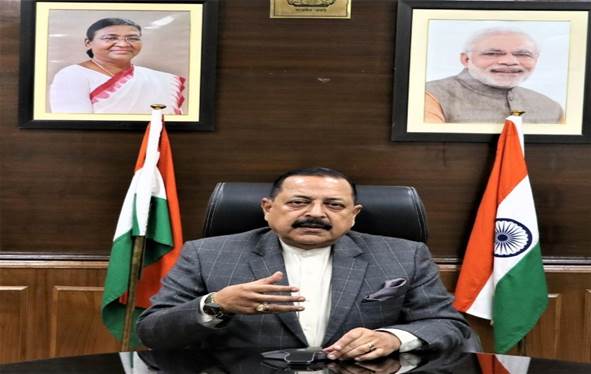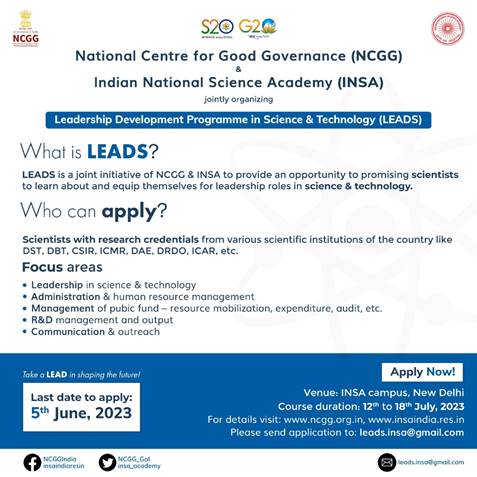
To realise Prime Minister Shri Narendra Modi’s Vision of India@ 2047 for scientific and technological advancements during Amrit Kaal, the National Centre for Good Governance (NCGG) and the Indian National Science Academy (INSA) have joined hands and have launched the ‘NCGG – INSA Leadership Programme in Science & Technology (LEADS). Recognizing the critical role played by the scientific leadership in driving scientific progress, this joint initiative seeks to empower them with the tools and capabilities required to effectively lead and navigate the rapidly evolving landscape of science and technology.

The Amrit Kaal of Independence marks a significant turning point in India’s scientific journey, symbolizing the nation’s resolute commitment to nurturing excellence. Prime Minister shri Narendra Modi, recognizing the extraordinary potential of India’s scientific community, has played a pivotal role in establishing an enabling ecosystem that fosters innovation and empowers scientists. This approach underscores his unwavering belief in the transformative power of scientific research and technology to propel India’s advancement.
To translate Prime Minister Shri Modi’s vision into reality, Dr. Jitendra Singh, Minister of State (MoS) for Science & Technology as well as Personnel, Pubic Grievances & Pensions, is working with and motivating scientists and nurturing a collaborative environment with R&D institutions to drive their contributions towards building a prosperous India. With his efforts, a more cohesive and collaborative environment has been fostered, where scientific breakthroughs seamlessly integrate into policies and programmes to bring substantial benefits to the people of the country.
The one-week fully residential programme starting from 12th July, 2023 will take place at the prestigious INSA Campus in New Delhi. Scientists from various renowned scientific institutions, including under the aegis of the Dept. of Science & Technology (DST), Dept. of Biotechnology (DBT), Council of Scientific & Industrial Research (CSIR), Indian Council of Medical Research (ICMR), Dept. of Atomic Energy (DAE), Defence Research & Development Organisation (DRDO), Indian Council of Agricultural Research (ICAR), and other laboratories and institutions, are invited to participate. The programme seeks to bring in scientists who have displayed promising research credentials and demonstrated their potential for leadership positions.

From pioneering space missions to deep ocean exploration, from the National supercomputing mission to the semiconductor mission and mission hydrogen, and advancements in drone technology, India is driving forward numerous ambitious initiatives at an accelerated pace. As these initiatives continue to scale and expand, there arises a pressing need to empower scientists with essential leadership skills.
The leadership programme in Science & Technology has been designed to provide participants with an enriching experience and a deep understanding of emerging areas. Throughout the seven-day programme, scientists will be exposed to subjects such as institution building, statutory functions, governance, excellence in research, management, gender and diversity issues, Scientometrics, recruitment and mentoring of scientific human resources, industry-laboratory collaboration, financial management, interpersonal relations, national needs, resource generation, administration, digital governance, and more.
The programme will shed light on the challenges scientists may encounter in science and technology administration, equipping them with the necessary skills to overcome such hurdles. Participants will also learn how to effectively lead teams, manage resources efficiently, and develop comprehensive strategies to achieve organizational goals. Emphasis will also be placed on building capacities to handle stress, fostering effective teamwork, and managing conflicts that may arise within organizations.
The National Centre for Good Governance (NCGG) was set up in 2014 by the Government of India as an apex–level autonomous institution under the auspices of the Ministry of Personnel, Public Grievances and Pensions. NCGG deals with a gamut of governance issues from local, state to national levels, across all sectors. The Centre is mandated to work in the areas of governance, policy reforms, capacity building and training of civil servants and technocrats of India and other developing countries. So far, NCGG has imparted training to over 3,500 civil servants from 15 countries viz. Bangladesh, Kenya, Tanzania, Tunisia, Seychelles, Gambia, Maldives, Sri Lanka, Afghanistan, Laos, Vietnam, Bhutan, Myanmar, Nepal and Cambodia.
At the behest of the Government of India, the Indian National Science Academy (INSA) was established to foster excellence in science. For more than eight decades, INSA has served as an enabler, a think tank, and a mentor for Indian science by leveraging the collective knowledge resources of its 1,000+ fellows who specialize in various branches of science.
By nurturing leaders within the scientific community, the LEADS programme aims to drive transformative changes, promote innovation, and establish India as a leader in science-led development in the world.
Nominations for this programme can be made through
https://docs.google.com/forms/d/e/1FAIpQLSejHeTZM4fXU2ez_pPOZnNWAhv84KxO0cvcunRMO-Dy1pYlRw/viewform before 5th June, 2023.
For further information, please visit http://www.ncgg.org.in/sites/default/files/notification_document/LEADS-Programme.pdf
<><><><><>
SNC/PK

